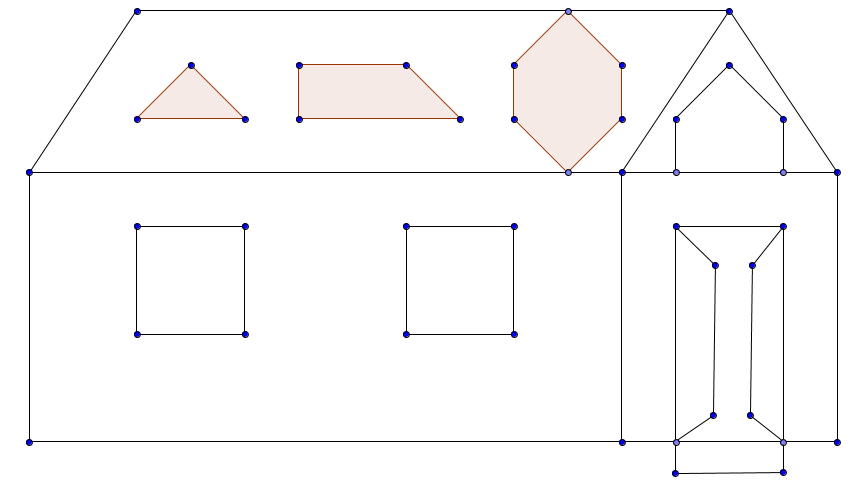Quadrilaterals
Revision as of 10:23, 16 December 2013 by sudha (talk | contribs) (→Concept #Introduction to Quadrilaterals)
Concept Map
Error: Mind Map file Quadrilaterals.mm not found
Text Books
Please refer the state govt. Text book of mathematics
Additional Information
Useful websites
- Effective Introduction to Quadrilateral click here
- Quadrilateral is also tetragon, quadrangle click here
Reference Books
- Please download 9th standard mathematics textbook of Tamil Nadu state syllabus from the following link and refer the page 89 click here
- Refer 9th standard mathematics ncert textbook from the following link click here
Teaching Outlines
- Introduction to polygons
- The meaning of quadrilateral
- Identification of various types of quadrilaterals
- Different properties of special quadrilaterals
- Construction of quadrilaterals to given suitable data
- Finding area of quadrilaterals
- Introduction to cyclic quadrilaterals
Concept # 1. Introduction to Quadrilaterals
Learning objectives
- Students will be able to define quadrilaterals.
- Students will be able to identify quadrilaterals.
Notes for teachers
This topic has its basics in polygons. Try to elicit live examples for quadrilaterals from within classroom, starting from the shape of a textbook. Show the vertices of a rectangular page. Mark three sets of four points on the blackboard, one set being collinear and other non-collinear. Call students to join the points of each set of points. This activity will introduce them to the concept of quadrilateral.
Activity No # Identifying quadrilaterals.
- Materials/ Resources needed
Pattern blocks for students, blank paper, colored pencils
- Estimated time
10-15 minutes
- Prerequisites/Instructions, if any
- The students should have prior knowledge of sides, angles and vertices.
- Student should be able to recognize 4 sided polygons.
- Multimedia resources: Laptop, geogebra file, projector and a pointer.
- Website interactives/ links/ / Geogebra Applets
Geogebra activities on Quadrilateral click here
- Process:
- Keep ready wooden blocks of mixed polygons.
- Tell students to take out blocks and trace them on a paper.
- Ask them to sort their pattern blocks – do not tell them how to sort.
- Go around and have each student tell you how they sorted. Write the different ways on the board. For duplicates, begin making tallies.
- Refer to the list (some students should have mentioned that they sorted by the number of sides). Point out the number of sides/angles as the sorting rule.
- Tell students that all of the blocks with four sides and four angles belong to the same family. That family is the “Quadrilateral” family. Explain that the blocks can have many names – just like you can be called many names.
- Have the students to fold their paper in half and to draw a line down the middle of the paper. On one half of the paper, write the word “Quadrilaterals”. On the other half of the paper write the words “Not Quadrilaterals.”
- Have students draw each of shape pattern block on the correct side of the paper.
- When all of the students have traced the pattern blocks on their papers, have different students come and present their method. The student should place a pattern block on the correct half of the paper so that students can all check their work.
- Developmental Questions:
- What type of figures are these ?
- What are solid figures ?
- On tracing what type of figures did you get ?
- What are plane figures ?
- From the traced figures, what parts of the figures do you identify ?
- What are polygons ?
- Are all figures the same ?
- What differences do you notice in the figures.
- By which parameter are you sorting ?
- Evaluation
- What do all of your quadrilaterals have in common?
- What is different about the quadrilaterals?
- Why did you put the hexagon on this half of the page?
- Can you combine your blocks to make different quadrilaterals?
- Question Corner
List out the quadrilaterals in this home.

Concept # 2.Properties of quadrilaterals
Learning objectives
Notes for teachers
Activity No #
- Estimated Time
- Materials/ Resources needed
- Prerequisites/Instructions, if any
- Multimedia resources
- Website interactives/ links/ / Geogebra Applets
- Process/ Developmental Questions
- Evaluation
- Question Corner
Concept #3. Types of quadrilaterals
Learning objectives
Notes for teachers
Activity No #
- Estimated Time
- Materials/ Resources needed
- Prerequisites/Instructions, if any
- Multimedia resources
- Website interactives/ links/ / Geogebra Applets
- Process/ Developmental Questions
- Evaluation
- Question Corner
Fun Corner
- Math is fun [[1]]